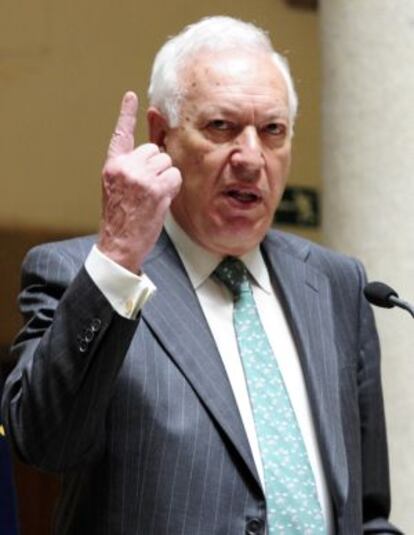Spain ups the ante in its dispute with Argentina over Respol
Foreign minister calls in ambassador to issue warning Any aggression against oil firm will also be seen as hostile to Madrid, Argentina told

With the threat of nationalization hanging over Repsol’s Argentinean unit YPF, Spain on Friday kept up its verbal barrage against Argentina, warning the government of Cristina Fernández de Kirchner that any act of “aggression” against the Spanish oil company would be considered hostile toward Spain.
“Any aggression against Repsol violates the principle of legal security and would be taken as an act of aggression against Spain,” Spanish Foreign Minister José Manuel Garcia Margallo told reporters after calling in Argentina’s ambassador to Madrid, Carlos Bettini, for talks.
However, Margallo launched a call for “dialogue,” acknowledging that the “energy issue is very important for the Argentinean government.”
According to a media report in Argentina, the Fernández government intends to send a bill to Congress authorizing the acquisition of a 50.1 percent stake in YPF. However, Eduardo Fellner, the governor of Jujuy, one of Argentina’s oil-producing provinces, denied this was the case. “Everything is under review. There is no legal plan to nationalize YPF.”
In a brief statement filed with the National Securities Commission (CNMV), Repsol said it had received no notification from the Argentinean government regarding its stake in YPF. Repsol has a 57.4-percent holding in YPF. Deputy Prime Minister Soraya Sáenz de Santamaría said the government was also unaware of any move against YPF.
Argentina wants Repsol to invest more in YPF instead of repatriating earnings in the form of dividends
The European Union also weighed into the fray on behalf of Spain. Brussels confirmed that the EU delegation in Buenos Aires had been in contact with the Fernández government to express its concerns about the fate of YPF.
Spain’s secretary of state for the EU, Iñigo Méndez de Vigo, told Spanish radio station Onda Cero that the nationalization of YPF “would be bad news for everyone, but also for Argentina.”
At a news conference after the regular Cabinet meeting, Saénz de Santmaría said the government “would not sit with its arms folded” with respect to the conflict. Asked what action the government might take if YPF is nationalized, she said: “You don’t announce measures, you take them, and I hope this government doesn’t have to take them.”
Referring to Margallo’s meeting with Bellini, Saénz de Santamaría said: “I invite the ambassador and [his] country to reflect on their next move.”
Repsol acquired YPF from the state in 1999 for 13.4 billion euros. It sold a stake in the company to the Argentinean business group Petersen-Eskenazi, which later increased its holding to 25.4 percent.
The Argentinean government retains a golden share in YPF that allows it to veto major corporate moves.
YPF accounts for about half of Repsol’s daily output, and also just under half of its reserves. It makes up about a third of Repsol’s gross profit.
Total investment by YPF in the past five years amounts to about $11 billion (8.3 billion euros), compared with dividend payments of $3.5 billion. Since the company was acquired in 1999 it has invested some $20 billion, including an annual record of $3.2 billion last year.
Repsol’s share price closed down 2.73 percent in a falling market. The blue-chip Ibex 35 was down 3.58 percent.
Tu suscripción se está usando en otro dispositivo
¿Quieres añadir otro usuario a tu suscripción?
Si continúas leyendo en este dispositivo, no se podrá leer en el otro.
FlechaTu suscripción se está usando en otro dispositivo y solo puedes acceder a EL PAÍS desde un dispositivo a la vez.
Si quieres compartir tu cuenta, cambia tu suscripción a la modalidad Premium, así podrás añadir otro usuario. Cada uno accederá con su propia cuenta de email, lo que os permitirá personalizar vuestra experiencia en EL PAÍS.
¿Tienes una suscripción de empresa? Accede aquí para contratar más cuentas.
En el caso de no saber quién está usando tu cuenta, te recomendamos cambiar tu contraseña aquí.
Si decides continuar compartiendo tu cuenta, este mensaje se mostrará en tu dispositivo y en el de la otra persona que está usando tu cuenta de forma indefinida, afectando a tu experiencia de lectura. Puedes consultar aquí los términos y condiciones de la suscripción digital.








































